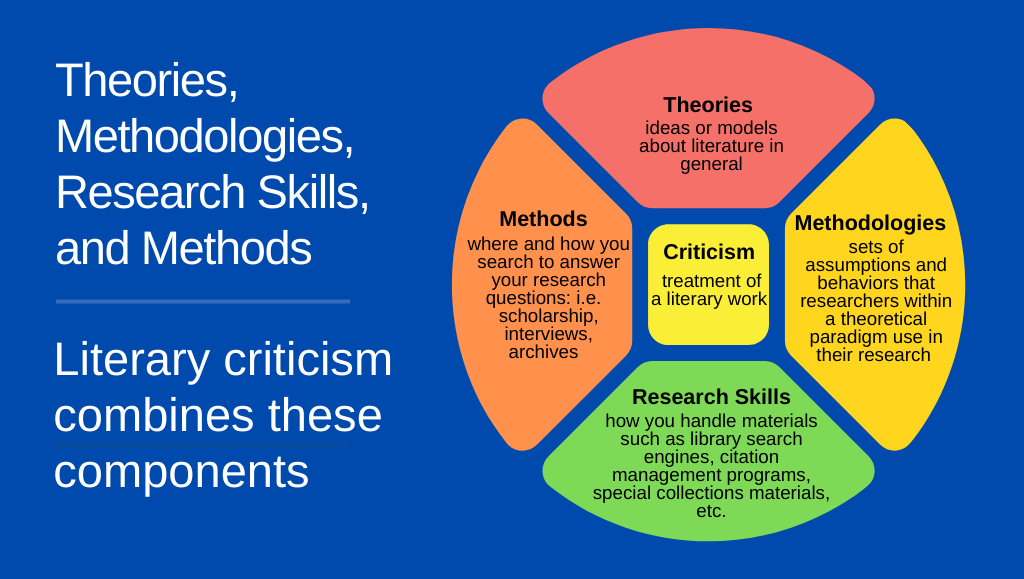Research Goals
Barry Mauer and John Venecek

Researchers work with a goal in mind. Common goals include
- Bringing readers closer to a text
- Connecting a text to a larger context
- Connecting a text with other knowledge frameworks such as science
Wendy Belcher, in Writing Your Journal Article in 12 Weeks, discusses the first two main approaches to understanding literary works: looking at a text by itself (associated with New Criticism) and looking at texts as they connect to society (associated with Cultural Studies). The goal of New Criticism is to bring the reader further into the text. The goal of Cultural Studies is to discuss the network of discourses that surround and pass through the text (its context). Other approaches, such as Ecocriticism, relate literary texts to the Sciences (as well as to the Humanities).
The New Critics, starting in the 1940s, focused on meaning within the text itself, using a method they called “close reading.” The literary text itself becomes evidence for a particular reading. Using this approach, you should summarize the literary work briefly and quote particularly meaningful passages, being sure to introduce quotes and then interpret them (never let them stand alone). Make connections within the work; ask “why” and “how” the various parts of the text relate to each other.
Cultural Studies critics see all texts as connected to society; the critic therefore has to connect a text to at least one political or social issue. The methodologies associated with cultural studies involve studies of power and studies of discourse (the language systems we use to make sense of the world). How and why does the text reproduce particular knowledge systems (known as discourses) and how do these knowledge systems relate to issues of power within the society? Who speaks and when? Answering these questions helps your reader understand the text in context. Cultural contexts can include the treatment of gender (Feminist, Queer), class (Marxist), nationality, race, religion, or any other area of human society.
Other approaches, such as psychoanalytic literary criticism, look at literary texts to better understand human psychology. A psychoanalytic reading can focus on a character, the author, the reader, or on society in general. Ecocriticism look at human understandings of nature in literary texts.
Let’s look at how two related theories – American formalism and Russian Formalism – seek different goals, and note that each one has attendant beliefs and practices that are related to these goals:
 Example [American Formalism vs. Russian Formalism]
Example [American Formalism vs. Russian Formalism]
American Formalism |
Russian Formalism |
|---|---|
| Goal: to understand a specific literary text independently by its own rules | Goal: to understand what makes literature “literary” (and different from ordinary language) |
| Believes form and content are closely connected | Believes form can be understood independently of content |
| Understands a literary text as a living organic being – greater than the sum of its parts | Understands literature using organic models such as morphology |
| Literary works (those of high value) possess a thematic unity that holds together all the parts | Literary language estranges or defamiliarizes ordinary language |
| Sought to professionalize the study of literature | Sought to professionalize the study of literature |
| Focuses on the text itself (rather than on author or reader psychology) | Focuses on the text itself (rather than on author or reader psychology) |
| Understands form as literary devices (irony, paradox) | Understands form as linguistic and structural features (that work to slow down perception) |
| Privileges metaphor | Privileges story and plot |
| Evaluates interpretations as better or worse | Evaluates literary devices as better or worse |
| Believes that the poet is not writing to express personal feelings and the reader is not reading subjectively | Believes that the poet makes use of literary language to defamiliarize language and the world |
| Believes that the poet presents an “objective correlative” – a set of objects, situations, or events that illuminate our relationship to reality | Believes that literary language defamiliarizes – which illuminates our relationship to reality |
| Practices close reading of individual texts | Identifies patterns across several texts |
| Quasi-religious practice that borrows from the reading of sacred texts | Scientific practice based on classification and division |
| Rejects outside information except in the case of allusions | Focuses on the text itself but may include the social situation in which the text makes sense |
The theory you choose should be aligned with your research goals; are you bringing your reader closer to the literary text, discussing its context, or relating it to other knowledge frameworks?
On the following pages, we discuss different types of theories, the methodologies those theories entail, and the methods and skills necessary to do research using your chosen theory.

